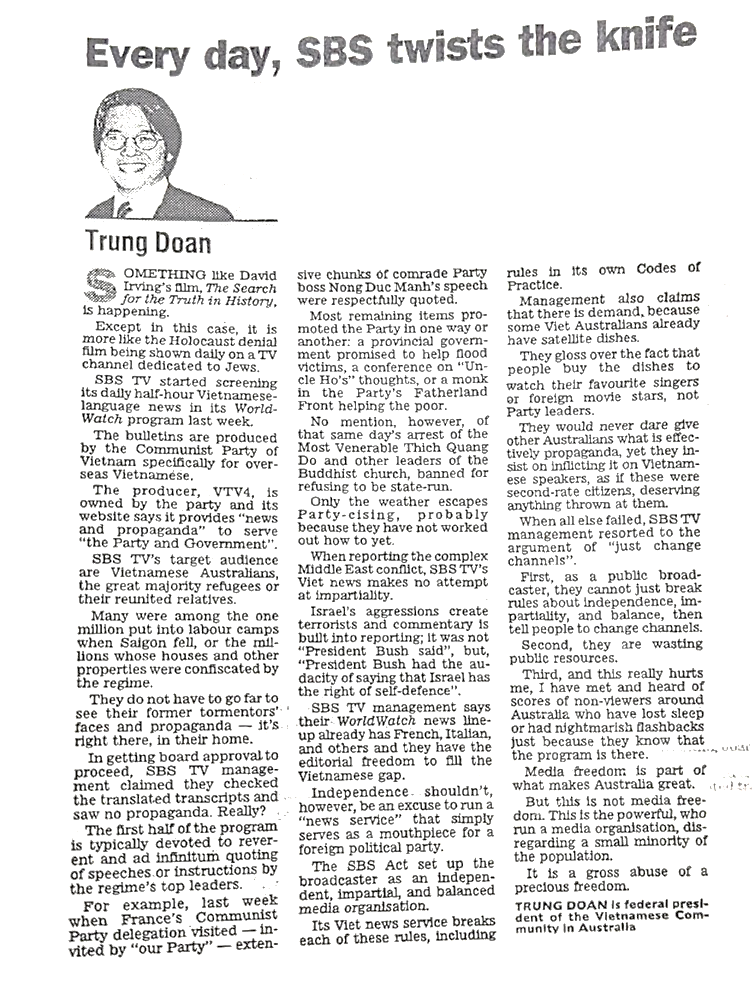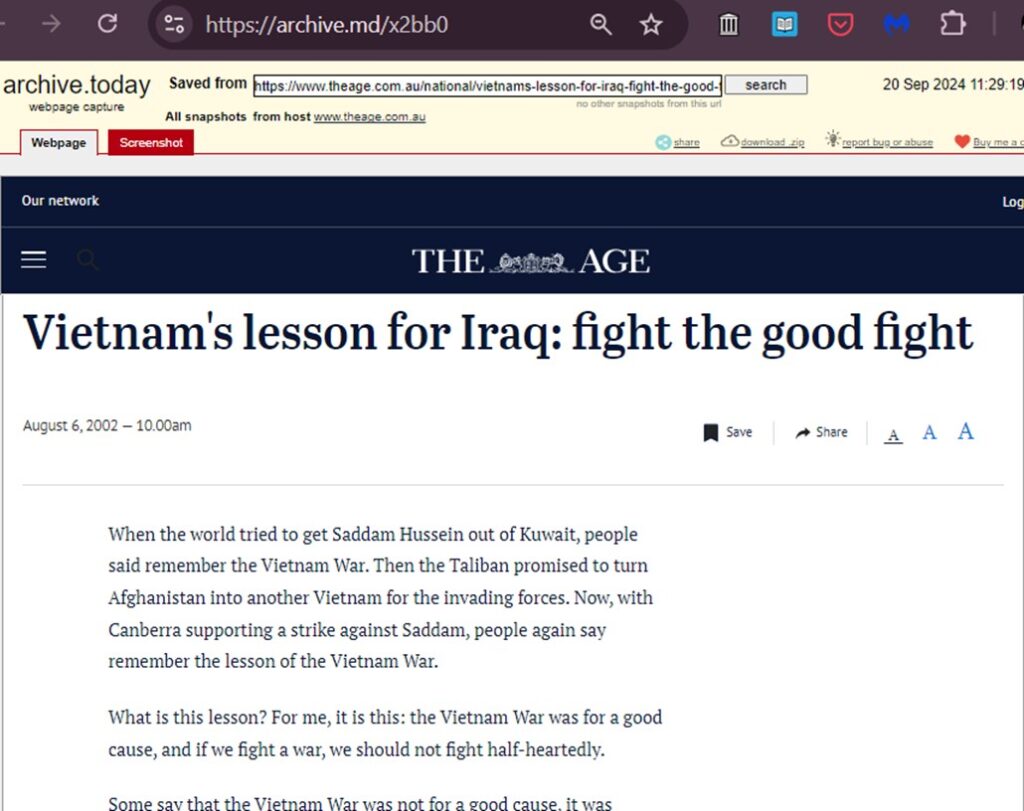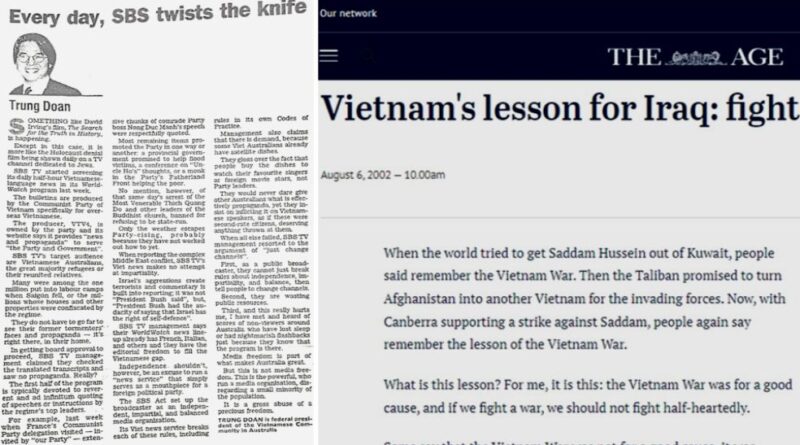Vietnamese Opinion Pieces in Australian Media
By Đoàn Việt Trung
(VCA Federal President 2000-2001, 2002-2003)
Editor’s Note: Nhan Quyen would like to introduce a series of articles by author Doan Viet Trung dedicated to Nhan Quyen on the occasion of the 50th anniversary of the search for freedom. Article 1 is about the Consular Agreement between Australia and Vietnam to protect Vietnamese Australians if they are detained in Vietnam. Article 2 is about a number of opinion articles by the Vietnamese community published in major Australian newspapers. Article 3 is about how the community convinced a publisher to revise its Australian high school textbooks that had provided a one-sided view of the Vietnam War. Article 4 is about one of the first Vietnamese newspapers in Australia, published on November 1, 1975. Articles 1, 2, and 3 are also published in the Yearbook that the Vietnamese Community in Australia/Queensland Chapter is about to publish (see attached front and back covers). Dr Cuong Bui passed away on 06 March, aged 80. Over nearly 30 years, the 2 men collaborated on a wide variety of community issues.

Article 2 of 4
Speaking to Australians through Australian media
In the early 2000s, when I joined the Executive Committee of the Vietnamese Community in Australia, I saw the need to speak up on issues of concern to our community. The best way to get our voice heard by many Australians was through mainstream media.
Therefore, I made an effort to write many opinion pieces, typically spending about 5-10 hours on each, from late afternoon until late at night. On average, for every 2 or 3 articles I wrote, 1 would be published. As a result of this effort, more than 20 opinion articles were published on the Opinion pages of major newspapers – from state-based newspapers like The Age or Herald Sun in Victoria, to national papers like The Australian or Australian Financial Review.
This article will illustrate the effort mentioned above through 2 of those pieces. One article addressed a current issue related to the Vietnamese community. The second article, typical of the majority of my pieces, dealt with a topic not directly related to our community but used current events to highlight issues of concern to the Vietnamese community.
Speaking to Australians About SBS TV
In 2003, our community fought to convince SBS TV that broadcasting the “news” program from VTV4 was an insult to Vietnamese Australian viewers.
Alongside asking politicians to speak up in Parliament, our community also voiced our concerns through the media – for example, Dr. Nguyễn Mạnh Tiến contacted Australian radio stations in Sydney, while I wrote an opinion piece that was published in the Herald Sun in Melbourne on October 16, 2003.
At that time, a well-known issue in Australia was about whether David Irving, a filmmaker who denied the Holocaust, should be granted a visa to enter the country.
Since the Irving issue was well-known, I began my article with this analogy: “Something like David Irving’s film, The Search for the Truth in History, is happening. Except in this case, it is more like a Holocaust denial film being shown daily on a TV channel dedicated to Jews.”

After this introduction, the article detailed how, just the week before, VTV had reverently reported the words of General Secretary Nông Đức Mạnh, while another broadcast boasted that the Fatherland Front had helped flood victims. However, they hid away the news that in the same week, police had arrested Most Venerable Thích Quảng Độ.
Further explaining VTV4’s propaganda role, the article wrote, “Only the weather escapes Party-cising, probably because they haven’t worked out how to yet.”
It also pointed out that many SBS viewers had been imprisoned in concentration camps called re-education camps. They were victims of the regime that controls VTV4.
Speaking to Australians about the Vietnam War
In 2002, Australians were debating whether the country should participate in the war against Saddam Hussein’s regime. At that time, Hussein was hinting that he possessed chemical weapons, though no-one has found solid proof.
I participated in that debate by writing an article published in The Age on August 6, 2002, titled “Vietnam’s lesson for Iraq: fight the good fight”.
The article began: “When the world tried to get Saddam Hussein out of Kuwait, people said remember the Vietnam War. Then the Taliban promised to turn Afghanistan into another Vietnam for the invading forces. Now, with Canberra supporting a strike against Saddam, people again say remember the lesson of the Vietnam War.
What is this lesson? For me, it is this: the Vietnam War was for a good cause, and if we fight a war, we should not fight half-heartedly.”

The article went on to say: “ Some say that the Vietnam War was not a good cause because the West killed innocent civilians. But anti-Saigon journalists did not reveal that communist guerrillas posed as civilians, to ensure that civilians were killed. And, while they highlighted the hundreds of My Lai victims, they were silent about the thousands massacred in Hue in 1968 by the communists.”
After discussing the past, the article turned to the present: “Today, while Western tourists see Saigon’s apparently happy face, behind that face is agony. I have a list of more than one hundred nuns, monks and priests, many of whom have rotted in prison for at least two decades.
The article also mentioned an act I deeply despise, which is the victors’ revenge on innocent civilians: Even taking revenge on a million former soldiers and public servants wasn’t enough for the victors, they additionally took revenge on everyone in the South, sparing no one – through currency changes: “Several times, the South Vietnamese people woke to find themselves penniless because the dong had been declared invalid overnight”
Other articles
My other published opinion articles mostly focused on refugees, foreign aid, or labor rights. Some argued that the Immigration Department should give Vietnamese boatpeople a chance to explain why they risked their lives to seek freedom across thousands of kilometres of ocean. Some advocated for stricter oversight of foreign aid because the Communist Party controls how aid money is spent. Others said that the Vietnamese regime’s taking away of workers’ union rights would lead to unfair competition in the Trans-Pacific Partnership (TPP), therefore TPP must restore union rights for workers in Vietnam.
-The End-



